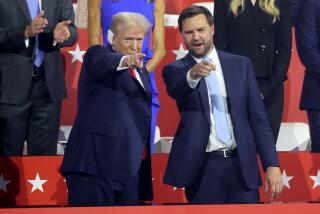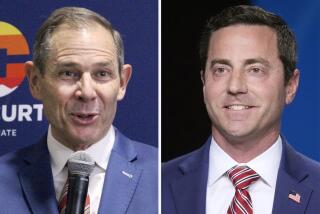GOP presidential contest begins to warm up
- Share via
Reporting from Bartlett, N.H. — — A rare sight materialized in New Hampshire over the weekend: “Mitt Romney for President” campaign signs stuck into snowbanks along the road to a remote White Mountain resort hotel.
“I don’t know where they came from,” Romney, an undeclared candidate, coyly told 250 activists at a Republican Party fundraising dinner Saturday night in the hotel ballroom.
The leadoff presidential primary state, where politics never go out of season, would normally be cluttered with campaign posters by now. Not this year.
As winter turns to spring, the Republican presidential contest has been slow to warm up. But recent days offered signs of a thaw.
Photos: Potential 2012 GOP presidential candidates
Former House Speaker Newt Gingrich dipped his toe into the 2012 race, moving toward a formal declaration. Romney’s public appearance in New Hampshire was his first there since before last fall’s election. On Monday, potential Republican candidates will address a presidential forum for evangelical Christians in Iowa.
“Things have picked up dramatically in the last couple of weeks,” Iowa Republican Party Chairman Matt Strawn told reporters in Washington recently.
But none of the major contenders has formed a full-fledged candidacy yet, preventing them from raising the tens of millions needed for a national campaign.
And the guest list for the Iowa forum — Gingrich and former Pennsylvania Sen. Rick Santorum will be there, but the most prominent social conservatives, Sarah Palin and Mike Huckabee, won’t — points to another unusual dimension to the Republican race: On the right, home to the party’s activist base, the absence of a prominent contender is creating an unexpected void.
“The field at the moment doesn’t have a single strong candidate around which the more ideological base has coalesced,” said Tom Rath, a veteran party strategist and Romney advisor in New Hampshire.
Palin, the 2008 vice presidential nominee, has said prospective candidates need to start campaigning soon, so voters can take their measure; but her most prominent event this month could be in India, where she is to address a New Delhi business conference. Her presidential plans remain a mystery.
Huckabee, the most successful social conservative in the 2008 primaries, leads in some early polling but is seen as a questionable starter. Cliff Hurst, who co-chaired Huckabee’s last New Hampshire campaign, said the former Arkansas governor did nothing to discourage him when he let Huckabee know he was planning to support former Minnesota Gov. Tim Pawlenty this time.
Another anomaly this year: None of the likely GOP contenders can claim strong national security credentials —even though that has typically been a Republican hallmark.
The closest thing to a national Republican voice on foreign policy belongs to Sen. John McCain, the 2008 presidential nominee, who isn’t running again. Former Utah Gov. Jon Huntsman may attempt to fill that space after he returns next month from his post as ambassador in Beijing; but first he may have to convince Republican activists that his service in the Obama administration isn’t a disqualifier.
There are also hints that the mix of GOP candidates could be smaller — and have less heft — than seemed likely a few months ago.
Minnesota Rep. Michele Bachmann, a favorite of “tea party” activists, appears increasingly likely to become a serious contender. She could be particularly strong in her native Iowa, where social and religious conservatives dominate.
Mississippi Gov. Haley Barbour, once a prominent Washington lobbyist, retains deep ties to Republican fundraisers across the country. He seems increasingly likely to run and could be a significant factor in the South, the heart of today’s GOP. Gov. Mitch Daniels of Indiana, whose tough talk about federal spending attracted considerable attention over the last month, may decide to pass up the race.
In a sign that some Republican voters are dissatisfied with the choices at hand, there has been considerable interest in popular governors such as Chris Christie of New Jersey and Rick Perry of Texas. But they, along with other potential candidates, such as Florida’s newly elected Sen. Marco Rubio and former Gov. Jeb Bush — who appeared last week in Miami with President Obama — have said they aren’t running.
Republican strategists had expected new contenders to emerge after the party scored major gains in the 2010 midterm election. Instead, the news has mostly been about those who toyed with running and took a pass, including Sen. John Thune of South Dakota and Indiana Rep. Mike Pence.
The rigors of presidential campaigning and the high personal cost involved are often cited as reasons why many political figures decline to run. A more pragmatic explanation may be Obama’s rebound in the polls and continuing signs of economic recovery. That has made the 2012 GOP nomination seem less alluring than it did last fall.
“Obama is going to be a formidable candidate, and people are starting to wonder just how vulnerable he’s likely to be,” said Bob Bestani, a party activist in New Hampshire, whose view is shared privately by some leading Republicans, including members of Congress.
Obama, running unopposed for renomination, is expected to form a reelection committee soon and has already started raising money for his party’s effort in next year’s campaign.
Pawlenty is expected to make his campaign official sometime next month. Romney may delay until late April or May, raising doubts about his participation in early debates. The first is scheduled for May 2 at the Reagan Presidential Library in Simi Valley, with another in South Carolina three days later, and his absence would diminish their importance.
Some who greeted Romney at the New Hampshire dinner were disappointed that he didn’t announce his entry into the 2012 contest, but there was little doubt he would. The former Massachusetts governor described himself as a “turnaround” specialist who would focus on putting America’s economy back on track.
“President Obama will be a one-term president,” Romney said.
More to Read
Get the L.A. Times Politics newsletter
Deeply reported insights into legislation, politics and policy from Sacramento, Washington and beyond. In your inbox twice per week.
You may occasionally receive promotional content from the Los Angeles Times.










